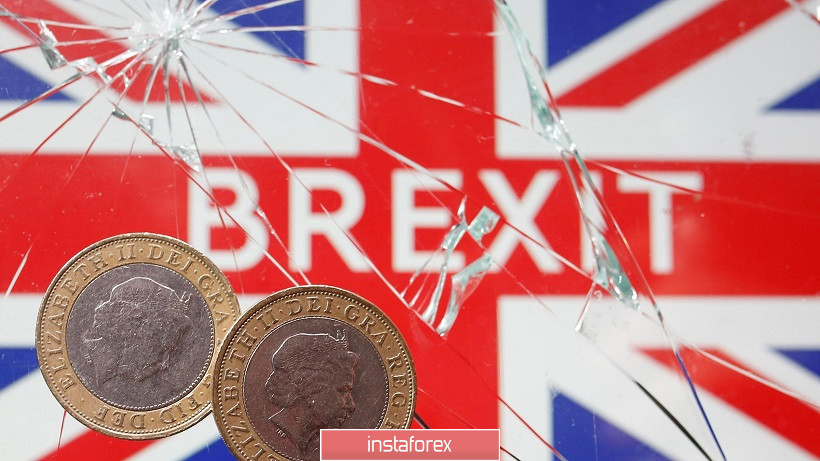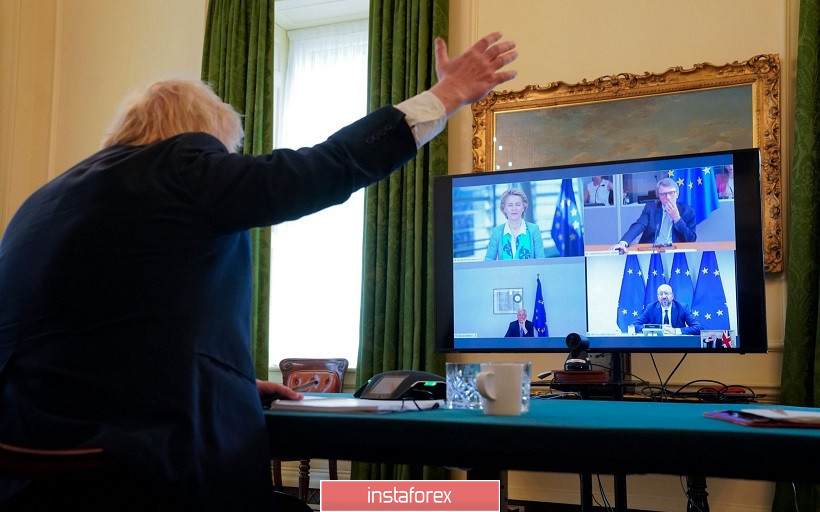The results of yesterday's dialogue between British Prime Minister Boris Johnson and the leadership of the European Union appealed to the bulls of the GBP/USD pair: the pound regained its position, especially against the backdrop of a weakening dollar. Although no specific decisions were made yesterday, the general optimistic mood of the summit gave hope for investors. Whether these hopes are justified or not is an open question, but the fact remains: the British currency has risen in price over the last 24 hours not only in dollar pairs, but also in cross pairs, reflecting increased demand.

As expected, traders of GBP/USD pairs did not focus on the latest macroeconomic reports. Although last week's statistics abounded with anti-records. For example, it became known that the British economy declined by a record 20.4%, which is the largest drop in the history of the country. Large losses were recorded in imports and exports, while the airline market plummeted by 92%. At the same time, the service market fell by 88% due to the closure of hotels, bars and restaurants. Against the backdrop of the coronavirus crisis, almost all areas of the country's economy suffered, with almost no exceptions. The industrial production indicator also showed an anti-record (-20.3%), and the production volume of the processing industry declined by almost 30% in annual terms. This really has never happened in the entire history of observations. The unemployment data published today only worsened the situation and although the unemployment rate remained at around 3.9%, the number of applications for unemployment benefits jumped to 528 thousand. Salary data also appeared in the "red zone" in both annual and monthly terms.
But despite such "killer" statistics, the pound actually held back the blow although it fell in pair with the dollar, due to the general strengthening of the US currency. The GBP/USD bears neither on Friday, nor yesterday, nor (yet) today were able to break through the middle line of the Bollinger Bands indicator on the daily chart.
On the other hand, Brussels and London did not negotiate yesterday in the classic sense of the process. Indeed, the summit ended with a rather unclear joint statement: the parties only announced their desire to conclude a deal and their intention to intensify the speech. At the same time, they never set a new date for the negotiations, not to mention the persistence of disagreements on key issues. Boris Johnson voiced a more specific position - he said that he hopes to complete negotiations on further EU-UK relations next month. Apparently, it was the position of the British prime minister that helped the GBP/USD bulls rise to the middle of the 26th figure.
In my opinion, the current growth of the pair is unreasonable and short-term. According to the overwhelming number of experts, the parties will not have time to agree on all points of the trade agreement in such a short time. At the moment, there is no agreement between the parties on almost all issues – from fishing and agriculture to pharmaceutical rules and tariffs. All previous rounds of negotiations ended to no avail - neither London, nor Brussels made concessions, despite the approach of the established "deadline". Boris Johnson once again made it clear yesterday that he did not intend to extend the transition period, hinting that by the end of the next one, it will be clear whether further negotiations have any prospects or whether the country should prepare for a new format of relations, without a trade deal.

Some analysts admit that the head of the British government, so to speak, is "bluffing", trying to improve London's negotiating position. He demonstrated similar tactics last year, but in the end, he still extended the negotiation process. According to a number of experts (both from the British and European sides), Johnson will also be forced to extend the transition period this year and here, it is not only a matter of pressure from Brussels. According to the latest survey conducted by Ipsos MORI analysts, 54% of Britons are in favor of the government asking the EU for a postponement. According to another survey, the number of supporters of the extension is almost 70%, given that without a deal, the country may have problems with the supply of medicines. At the same time, the rating of Johnson himself suffered quite a lot during the coronavirus crisis. Many Britons accuse conservatives of failing to respond to the threat of a pandemic on time and quarantining the country too late. Coronavirus brought down not only the ratings of the prime minister, but also the government, whose actions are approved by only 30% of British citizens. Therefore, at the last moment, Johnson will probably agree to extend the negotiations, but before that, he will have a lot of nerves - both for European negotiators and for GBP/USD traders.
To sum everything up, it can be said that the pound is hopeful again. The parties agreed to "give impulse" to the negotiations, but none of the participants explained whether they were ready to make concessions in order to reach a compromise. Amid such uncertainty, the pound is unlikely to develop an upward offensive, so it is advisable to consider current positions as an occasion for sales to the first support level of 1.2460 (the middle line of the Bollinger Bands indicator on the daily chart).





















